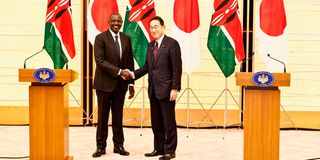Explainer: How Kenya can transform ‘outreach’ diplomacy

President William Ruto (left) with Japan's Prime Minister Fumio Kishida in Tokyo, Japan.
It may not be an exaggeration to say that many Kenyans don't understand what the Kenyan Ministry of Foreign and Diaspora Affairs (MFDA) does. In some cases, they don't even know the ministry exists. This is because the MFDA has failed to manage and communicate Kenya's global foreign relations.
The Fourth Schedule of the Constitution of Kenya identifies foreign affairs and foreign policy as a national government function. This is mandated by Executive Order No. 1 of June 2018, which lists 20 functions for the ministry.
Three very important functions are management of Kenya's foreign policy; projection, promotion and protection of Kenya's interests and image globally; and official communication on global foreign relations. These three functions make the MFDA a virtual library and control tower of Kenya's foreign relations.
The failure to perform these functions effectively has put Kenya in an embarrassing and dangerous position. Let me illustrate this through an analysis of President William Ruto's recent visit to Japan.
On January 26, 2024, the Ministry of Foreign Affairs (Mofa) of Japan announced that President Ruto and First Lady Rachel would pay an official visit to Japan from February 6 to 9. There was no similar letter from the MFDA.
Mofa announced the outcome and results of the presidential visit on February 8, from Japan's perspective. They began by reporting what Prime Minister Fumio Kishida said during the "Japan-Kenya Summit."
Mr Fumio stated that "Japan would like to further strengthen bilateral relations with Kenya, which shares fundamental values and principles such as the "rule of law", and to work closely to promote the Free and Open Indo-Pacific (Foip) and to maintain and promote a free and open international order based on the rule of law.
His speech aligns with Japan's 2024 Foreign Policy Direction, as presented to the 213th Session of the DIET (Japanese National Assembly) by Kamikawa Yoko, Japan's Foreign Minister on January 30, 2024. Kamikawa highlighted 13 priorities, including Foip, which is of little interest to Kenya. In all, she had no policy for Kenya and Africa.
Mofa then confirms that there was an exchange of documents and that four documents were exchanged.
One was an E/N on the project to strengthen the research capacity of the Kenya Medical Research Institute. Another was a Memorandum of cooperation between the Ministry of Internal Affairs and Communications of Japan and Kenya's Ministry of Information, Communications and the Digital Economy on cooperation in the field of Information and Communication Technology.
The other two documents are the Memorandum of Cooperation between the Ministry of Land, Infrastructure, Transport and Tourism of Japan and the Ministry of Roads and Transport of the Republic of Kenya on cooperation in the development of public-private partnership projects in Kenya and the Memorandum of Understanding on defence cooperation and exchanges between Japan and Kenya.
To date, the MFDA has not informed Kenyans and the global community why President Ruto visited Japan and what he achieved.
This is the danger when MFDA fails to manage Kenya's foreign policy and communication. At the end of the Mofa report, it says: "After the document exchange ceremony, the two leaders held a joint press conference".
Mofa doesn't volunteer details of the joint press briefing. However, the next day, Kyodo News, the leading news agency in Japan and distributor of news to all media networks since 1945, published what was said at the joint press conference.
The publication reports that "Kishida also told President Ruto that Japan would help Kenya restore its financial health, which has been strained by loans from China for railway construction and other projects".
Kyodo News adds that "Kishida and Ruto reaffirmed the importance of fair and transparent financial development to ease Kenya's debt problems, with China criticised for engaging in "debt trap diplomacy," using loans as leverage to gain concessions from borrowing nations."
Now, for two leaders to ridicule another sovereign state is undiplomatic. Moreover, this episode is an embarrassment for Kenyans and China.
To avoid such gaffes, the MFDA must engage in global and domestic outreach diplomacy, manage Kenya's foreign policy and maintain official communication on global foreign relations. In this way, the MFDA will be able to project, promote and protect Kenya's interests and image abroad.
Ambassador Ngovi Kitau, First Ambassador of Kenya to the Republic of Korea and Specialist in Korean Peninsula Studies. [email protected]





